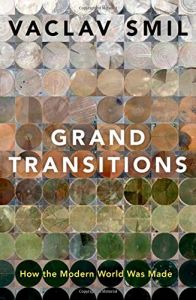Join getAbstract to access the summary!

Join getAbstract to access the summary!
Vaclav Smil
Grand Transitions
How the Modern World Was Made
Oxford UP, 2021
What's inside?
Economic, demographic, agricultural, energy and environmental shifts shape today’s world and the future.
Recommendation
Today’s world is the result of four “grand transitions,” environmental scientist Vaclav Smil states. In this numbers-driven chronicle of major transitions in energy, agriculture, the economy, demographics and the environment over the past 250 years, Smil provides balanced arguments about both benefits and costs. These transitions, he writes, produced a safer, healthier and richer world for at least half the planet’s population, but also led to environmental destruction. It’s an important account, though some readers may feel Smil’s strong focus on data detracts from his narrative.
Summary
About the Author
Emeritus professor Vaclav Smil is one of the world’s foremost experts on energy and other critical components of the global economy.























Comment on this summary